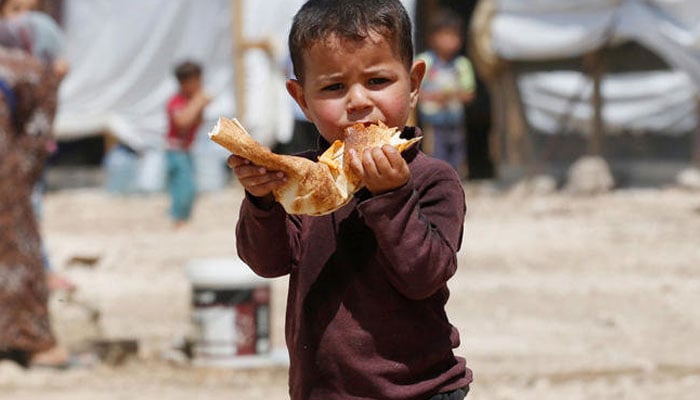Inflation, climatic changes pushed 16pc population into hunger
ISLAMABAD: Hunger, the distress associated with a lack of food, and food insecurity are strongly interconnected with poverty and are caused by an array of social, political, demographic, and societal factors, show statistics.
According to the Pakistan Bureau of Statistics (PBS), the Household Integrated Economic Survey (HIES) 2018-19 reveals that 16% of Pakistan’s population is experiencing moderate or severe food insecurity with the incidence of being twice as high in rural areas than urban areas: 20% and 9.2% respectively.
Pakistan Social and Living Standards Measurement surveyed Pakistani households in 2019-2020 and has apprised that 16.4 out of every 100 households face moderate-to-severe food insecurity. In 2020, factors like high food prices, locust outbreaks, climate events such as rains, flooding, droughts, and the effects of the COVID-19 pandemic all exacerbated these numbers.
While the issue is being handled well at both national and local levels by the government and the non-profit charity organisations, the challenges surrounding food security are still prevalent. Although hunger is not the only major issue, it’s a major problem faced by Pakistanis on daily basis, said Lieutenant Colonel (r) Shahzad Kiani of the Yusaeid Foundation.
He said hunger alleviation and increasing food security were core elements of the organsiation's mission. "I strongly believe that a concerted volunteer effort, coupled with empathy and volunteer action will go a long way towards making our dream of a hunger-free Pakistan come true,” he said.
He said established in 2014, the foundation regularly distributes rations to those in dire need. Ration and Iftar drive along with free healthcare are just two of their initiatives aimed to provide relief to the needy and destitute population of the twin cities," he said.
-
 King Charles, Princess Anne, Prince Edward Still Shield Andrew From Police
King Charles, Princess Anne, Prince Edward Still Shield Andrew From Police -
 US Set To Block Chinese Software From Smart And Connected Cars
US Set To Block Chinese Software From Smart And Connected Cars -
 Carmen Electra Says THIS Taught Her Romance
Carmen Electra Says THIS Taught Her Romance -
 Leonardo DiCaprio's Co-star Reflects On His Viral Moment At Golden Globes
Leonardo DiCaprio's Co-star Reflects On His Viral Moment At Golden Globes -
 SpaceX Pivots From Mars Plans To Prioritize 2027 Moon Landing
SpaceX Pivots From Mars Plans To Prioritize 2027 Moon Landing -
 King Charles Still Cares About Meghan Markle
King Charles Still Cares About Meghan Markle -
 J. Cole Brings Back Old-school CD Sales For 'The Fall-Off' Release
J. Cole Brings Back Old-school CD Sales For 'The Fall-Off' Release -
 GTA 6 Built By Hand, Street By Street, Rockstar Confirms Ahead Of Launch
GTA 6 Built By Hand, Street By Street, Rockstar Confirms Ahead Of Launch -
 Funeral Home Owner Sentenced To 40 Years For Selling Corpses, Faking Ashes
Funeral Home Owner Sentenced To 40 Years For Selling Corpses, Faking Ashes -
 Why Is Thor Portrayed Differently In Marvel Movies?
Why Is Thor Portrayed Differently In Marvel Movies? -
 Dutch Seismologist Hints At 'surprise’ Quake In Coming Days
Dutch Seismologist Hints At 'surprise’ Quake In Coming Days -
 Australia’s Liberal-National Coalition Reunites After Brief Split Over Hate Laws
Australia’s Liberal-National Coalition Reunites After Brief Split Over Hate Laws -
 DC Director Gives Hopeful Message As Questions Raised Over 'Blue Beetle's Future
DC Director Gives Hopeful Message As Questions Raised Over 'Blue Beetle's Future -
 King Charles New Plans For Andrew In Norfolk Exposed
King Charles New Plans For Andrew In Norfolk Exposed -
 What You Need To Know About Ischemic Stroke
What You Need To Know About Ischemic Stroke -
 Shocking Reason Behind Type 2 Diabetes Revealed By Scientists
Shocking Reason Behind Type 2 Diabetes Revealed By Scientists




